Turning 70 is a significant milestone, and for drivers in the UK, it brings important considerations about continued eligibility to drive. Many older adults living in London and throughout the UK wonder: do you have to retake your driving test at 70? The short answer is no but the process of renewing your driving licence involves a series of steps that must not be ignored.
This guide explores the full scope of what drivers aged 70 and above need to know about licence renewal, DVLA requirements, medical conditions, eyesight standards, and available resources. It’s essential reading for anyone approaching this age or supporting someone who is to remain legally compliant and safe on the roads.
What Happens to Your Driving Licence When You Turn 70?
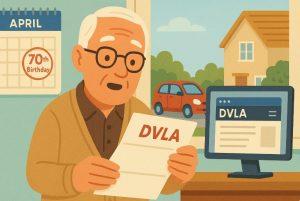
Validity of the driving licence after 70
When a driver turns 70 in the UK, their full driving licence does not automatically remain valid. Instead, the law requires the driver to renew the licence every three years starting from their 70th birthday. Without renewal, the licence becomes invalid, and continuing to drive would be illegal.
DVLA renewal notification process
The DVLA typically sends a form called D46P about 90 days before a driver’s 70th birthday. This serves as a reminder to renew and includes instructions for both online and postal renewal. If a driver does not receive this form, they are still responsible for initiating the renewal themselves especially if their address is not updated in DVLA records.
Do You Have to Retake Your Driving Test at 70 in the UK?
Legal obligations at age 70
There is no requirement under UK law to retake either the practical or theory driving test upon turning 70. However, drivers must complete a self-declaration stating they are medically fit to drive. This self-assessment is a critical part of the renewal process, and failure to disclose relevant medical conditions could have legal consequences.
DVLA requirements for older drivers
Although retaking the driving test is not mandatory, the DVLA expects elderly drivers to be transparent about their health. In some cases particularly where medical conditions affect driving ability the DVLA may require further assessments, reports from healthcare providers, or even an on-road driving evaluation.
How Do You Renew Your Driving Licence at 70?
Overview of the D46P renewal form
The D46P is a renewal form specifically sent to people turning 70. It contains a section to complete your personal information, medical self-declaration, and confirmation of your eligibility to continue driving. The form can be returned by post along with any additional documentation required.
Online and postal renewal options
For most individuals, renewing online via GOV.UK is the fastest and simplest method. You will need your National Insurance number, passport (if you want to update your photo), and current driving licence. For those less comfortable with digital platforms, the postal option using the D46P remains fully valid.
Comparison of Licence Renewal Methods
| Method | Processing Time | Requirements | Cost |
| Online (GOV.UK) | Around 1 week | National Insurance No, Passport, Licence | Free |
| By Post (D46P) | 3 to 4 weeks | Completed form, passport photo (if needed) | Free |
What Are the Medical Requirements to Drive After 70?
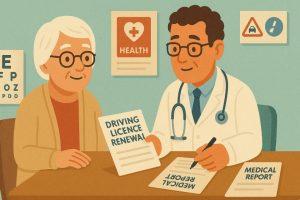
Medical conditions and legal responsibilities
Drivers aged 70 and over must report any medical conditions that could impair their driving ability. Conditions such as epilepsy, diabetes, dementia, and strokes are among the most commonly reported. In some cases, further documentation or assessment is needed before the DVLA will approve a licence renewal.
Common conditions affecting elderly drivers
Health issues that typically emerge with age including arthritis, slower reaction times, and memory lapses can influence safe driving. While not all require reporting, drivers are expected to judge honestly whether their ability to drive is compromised.
Are There Vision Standards for Over 70s Drivers?
DVLA eyesight requirements
According to the DVLA, drivers must be able to read a number plate from 20 metres away (with or without glasses/contact lenses). This is a core requirement for anyone driving in the UK, not just those over 70. Drivers must also have a visual acuity of at least 6/12 and an adequate field of vision.
Importance of regular eye tests
Although the DVLA does not mandate annual eye exams, it is strongly advised that people over 70 visit an optician at least once a year. Early detection of cataracts, glaucoma, or macular degeneration can ensure safer driving and better health outcomes.
What Are the Common Myths About Driving Over 70?
Misconception of automatic disqualification
Many people wrongly believe that drivers lose their licence at 70. In truth, you can legally continue driving as long as you renew your licence and meet DVLA medical and vision requirements. Age alone is not a disqualifier.
Public perception and driving ability
Despite public assumptions, older drivers tend to be more cautious, have fewer speeding tickets, and are less likely to be involved in drink-driving incidents. However, physical and mental decline remains a concern, particularly in densely populated cities like London.
How Can Older Drivers Stay Safe and Confident on the Road?
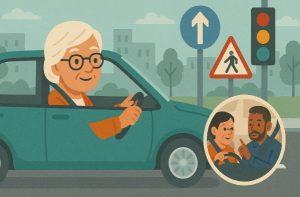
Benefits of refresher driving courses
Refresher courses are highly beneficial for elderly drivers. These are short sessions designed to improve awareness of current road laws, signage changes, and driving techniques. Organisations like RoSPA and IAM RoadSmart offer these courses with a focus on practical skill improvement.
Lifestyle habits that enhance driving safety
Maintaining good sleep, avoiding driving during peak hours, reducing night driving, and staying hydrated are simple but effective ways to remain safe on the road. Equally important is keeping an open line of communication with healthcare providers about medication and fitness to drive.
Is There an Age Limit for Driving in the UK?
Legal age limits for driving
There is no maximum age limit for driving in the UK. As long as the driver is medically fit and renews their licence every three years, they can continue driving well into their 80s or even 90s.
Knowing when to stop driving
Some individuals may voluntarily stop driving when they feel uncomfortable or unsafe. This decision is often made with input from family or health professionals. Warning signs include getting lost on familiar routes, delayed reactions, or minor accidents.
What Support Is Available for Elderly Drivers in the UK?
Driver assessment and advisory services
Free and subsidised driving assessments are available across the UK. These are not tests but evaluations designed to help drivers understand their strengths and areas needing improvement. Local authorities, charities, and insurance firms often collaborate in offering these resources.
Organisations and resources for elderly drivers
Several organisations provide targeted support to drivers over 70, including:
- DVLA for licence renewals and medical disclosures
- Age UK for advice on staying independent
- RoSPA for refresher courses and safety assessments
- Opticians and GPs for vision and health evaluations
Can You Drive After 70 with a Medical Condition?
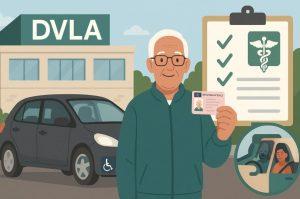
Driving eligibility with health conditions
While turning 70 doesn’t mean automatic disqualification from driving, having a medical condition can affect your eligibility. The DVLA requires that any notifiable medical conditions be reported when applying to renew your licence. These conditions include diabetes requiring insulin, Parkinson’s disease, multiple sclerosis, epilepsy, dementia, strokes, and more.
Drivers must disclose these conditions honestly and accurately, even if the symptoms are mild or well-managed. The DVLA may consult with your GP or specialist to assess how the condition impacts your ability to drive safely.
DVLA assessments for drivers with conditions
In certain cases, the DVLA may request additional documents, such as a medical questionnaire, recent test results, or a letter from your doctor.
In some instances, you may be required to undergo a driving assessment at a DVSA test centre or be referred to a Mobility Centre for a full evaluation. If the DVLA determines the condition does not impair your ability to drive, your licence will be renewed as normal usually for a shorter term like 1 or 3 years.
What Happens If You Don’t Renew Your Driving Licence at 70?
Consequences of not renewing on time
If you fail to renew your licence at 70, your existing licence becomes invalid on your 70th birthday. This means you are no longer legally allowed to drive until the renewal is successfully processed. Continuing to drive with an expired licence is considered an offence and may result in fines, penalty points, or prosecution, especially if you’re involved in an accident.
Driving while renewal is pending
If you’ve submitted your renewal application before your licence expires, the law allows you to continue driving while the application is being processed, provided you have not been told by the DVLA or a medical professional that you are unfit to drive. However, it’s advisable to carry a copy of your application or confirmation in case you’re stopped by police.
Conclusion
So, do you have to retake your driving test at 70 in the UK? No, but you must renew your licence every three years and confirm you’re fit to drive. While no new driving test is required, the DVLA expects honesty about medical conditions and eyesight. Staying informed, scheduling regular health checks, and considering refresher courses can help older drivers maintain safety and independence on the road.
FAQs
Can you drive while your renewal is being processed?
Yes, provided your previous licence hasn’t been revoked or refused, and you meet all medical and eyesight requirements.
Do you need a new photo when renewing online?
If your passport is valid and up to date, the DVLA can use that photo. Otherwise, you may need to submit a new one.
What happens if you don’t renew your licence at 70?
You are not legally allowed to drive until your licence is renewed. Driving without a valid licence can result in fines and legal action.
Can older drivers be forced to stop driving?
Not without cause. Only if a driver is found medically unfit or fails to meet DVLA requirements can their licence be revoked.
Are eyesight tests required for renewal?
While not mandatory, they are strongly recommended. Self-declaration assumes that your eyesight meets legal standards.
How do you update your address with DVLA?
You can update your address online through the GOV.UK site, or by post. It’s vital to keep details current to receive renewal forms.
Is insurance more expensive for drivers over 70?
It can be, though many insurers offer policies tailored to experienced drivers. Comparison sites are useful for finding competitive rates.








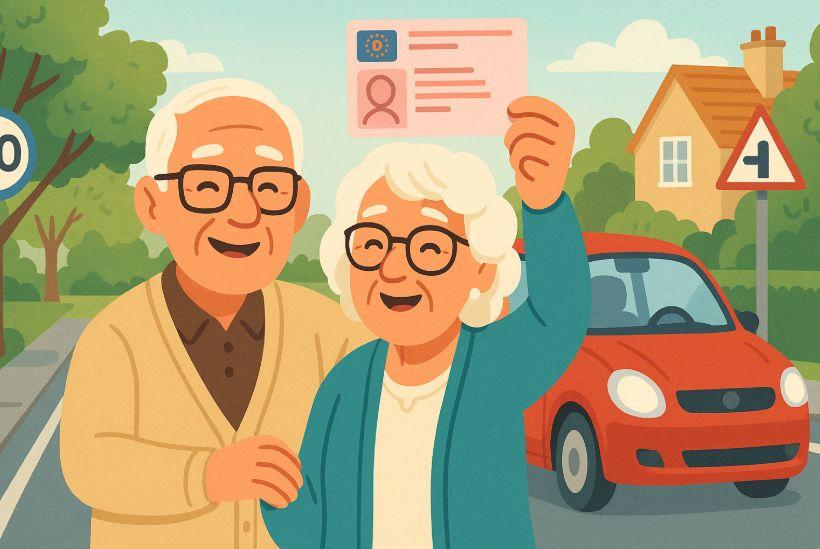
Leave feedback about this